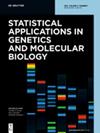On the relation between the true and sample correlations under Bayesian modelling of gene expression datasets.
IF 0.4
4区 数学
Q4 BIOCHEMISTRY & MOLECULAR BIOLOGY
Statistical Applications in Genetics and Molecular Biology
Pub Date : 2018-07-14
DOI:10.1515/sagmb-2017-0068
引用次数: 0
Abstract
Abstract The prediction of cancer prognosis and metastatic potential immediately after the initial diagnoses is a major challenge in current clinical research. The relevance of such a signature is clear, as it will free many patients from the agony and toxic side-effects associated with the adjuvant chemotherapy automatically and sometimes carelessly subscribed to them. Motivated by this issue, several previous works presented a Bayesian model which led to the following conclusion: thousands of samples are needed to generate a robust gene list for predicting outcome. This conclusion is based on existence of some statistical assumptions including asymptotic independence of sample correlations. The current work makes two main contributions: (1) It shows that while the assumptions of the Bayesian model discussed by previous papers seem to be non-restrictive, they are quite strong. To demonstrate this point, it is shown that some standard sparse and Gaussian models are not included in the set of models which are mathematically consistent with these assumptions. (2) It is shown that the empirical Bayes methodology which was applied in order to test the relevant assumptions does not detect severe violations and consequently an overestimation of the required sample size might be incurred. Finally, we suggest that under some regularity conditions it is possible that the current theoretical results can be used for development of a new method to test the asymptotic independence assumption.基因表达数据集贝叶斯建模下真相关性与样本相关性的关系。
本文章由计算机程序翻译,如有差异,请以英文原文为准。
求助全文
约1分钟内获得全文
求助全文
来源期刊

Statistical Applications in Genetics and Molecular Biology
BIOCHEMISTRY & MOLECULAR BIOLOGY-MATHEMATICAL & COMPUTATIONAL BIOLOGY
自引率
11.10%
发文量
8
期刊介绍:
Statistical Applications in Genetics and Molecular Biology seeks to publish significant research on the application of statistical ideas to problems arising from computational biology. The focus of the papers should be on the relevant statistical issues but should contain a succinct description of the relevant biological problem being considered. The range of topics is wide and will include topics such as linkage mapping, association studies, gene finding and sequence alignment, protein structure prediction, design and analysis of microarray data, molecular evolution and phylogenetic trees, DNA topology, and data base search strategies. Both original research and review articles will be warmly received.
 求助内容:
求助内容: 应助结果提醒方式:
应助结果提醒方式:


